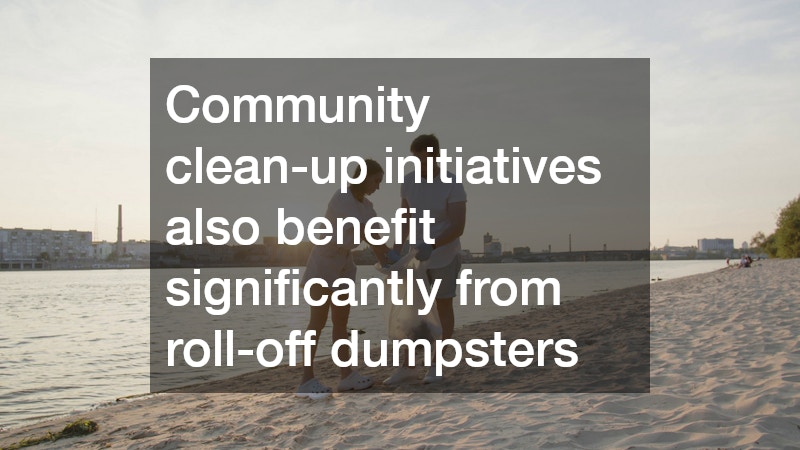In urban and rural settings alike, waste management is a crucial component of maintaining a clean and sustainable environment. This article delves into the myriad situations where utilizing local roll-off dumpsters can offer significant advantages in handling waste. Whether you’re planning a home renovation, coordinating a large-scale event, or orchestrating a comprehensive community cleanup, knowing when to opt for a roll-off dumpster can dramatically enhance your waste management strategy.
Choosing the right waste disposal method can make a substantial difference in the efficiency and cost-effectiveness of your project. Various scenarios necessitate different approaches to waste collection and disposal, from small-scale undertakings to more extensive endeavors that produce considerable volumes of refuse. This exploration will aid in understanding the contexts where roll-off dumpsters emerge as an optimal choice, thereby streamlining and simplifying the waste removal process.
Roll-off dumpsters are not only a logistic convenience but also play a critical role in meeting environmental and regulatory compliance standards. By providing a centralized location for waste containment and disposal, these dumpsters help mitigate pollution risks and promote a more organized handling of debris and materials. Professionals and individuals alike will benefit from recognizing the scenarios that warrant the use of roll-off dumpsters, ensuring an effective and responsible approach to handling waste.
What Are Roll-Off Dumpsters, and Why Are They Useful?
Definition and Functionality
Roll-off dumpsters are large, rectangular containers designed for ease of access and efficient waste collection. These dumpsters are typically transported on specialized trucks and rolled off onto the desired location, which provides their distinctive name. Primarily used for temporary waste storage, they are essential in scenarios requiring the accumulation of substantial amounts of debris, such as construction sites and large-scale clean-ups.
The functionality of roll-off dumpsters lies in their versatility and adaptability to various waste streams. They support diverse material types, encompassing everything from construction debris to household waste, making them suitable for multiple projects. Their robust design ensures they can withstand heavy loads and the rigors of demanding environments, contributing significantly to effective waste management.
Furthermore, roll-off dumpsters cater to the necessity of scalable waste disposal, accommodating different project sizes with various dimension options. The ease of delivery and removal is another critical advantage, providing a hassle-free solution for waste containment. With their capacity to handle large volumes of waste, they facilitate systematic waste disposal, minimizing delays and disruptions in project timelines.
Advantages Over Other Waste Disposal Methods
Compared to traditional waste disposal methods, roll-off dumpsters offer multiple benefits, including enhanced capacity and ease of use. Traditional bin rentals often restrict waste volume capacity and require frequent emptying, which can become inefficient and costly for larger projects. Conversely, roll-off dumpsters manage considerable waste volumes, reducing logistic complexities related to waste transport and handling.
Moreover, the flexibility of roll-off dumpsters in accommodating different waste types underscores their superiority over other waste removal options. This feature is crucial for projects involving mixed waste, as it negates the necessity for multiple collection solutions, streamlining the waste management process. The sturdy construction ensures they can hold heavy materials safely, minimizing risk factors associated with overfilling or inappropriate waste storage.
Additionally, roll-off dumpsters address environmental concerns by providing a contained and organized waste disposal system. This plays a significant role in reducing the potential for environmental contamination and promoting recycling practices. The centralized containment prevents material from dispersing, thereby limiting negative impacts on the surrounding area and facilitating a cleaner work environment.
Ideal Situations for Usage
Roll-off dumpsters are exceptionally beneficial in scenarios characterized by high waste generation, such as construction or renovation projects. Construction sites produce extensive debris, including concrete, metal, and wood, which requires systematic management through ample disposal solutions like roll-off dumpsters. Their sizeable capacity makes them ideal for accommodating varied materials, simplifying waste collection and removal.
Community clean-up initiatives also benefit significantly from roll-off dumpsters, providing a centralized point for waste collection and disposal. These endeavors often involve a wide range of debris types and quantities, from garden waste to discarded furniture, necessitating a versatile and high-capacity waste solution. By employing roll-off dumpsters, communities can enhance the efficiency of their clean-up projects and contribute to environmental conservation efforts.
Additionally, large-scale events, such as festivals or concerts, generate considerable amounts of waste rapidly, necessitating an effective disposal strategy. Roll-off dumpsters provide the necessary infrastructure to manage waste spikes, ensuring cleanliness and sanitation during and after the event. Incorporating these dumpsters into waste management plans helps event organizers maintain regulatory compliance and minimize environmental impact.
As projects and initiatives continue to scale globally, waste management practices must adapt to meet increased demand and environmental expectations. Embracing roll-off dumpsters ensures waste management strategies are not only pragmatic but also environmentally conscious, aligning with current sustainability goals. This comprehensive approach will support communities and businesses in creating a healthier and more sustainable future.
A strategic focus on incorporating roll-off dumpsters into waste planning prioritizes resource efficiency, cost-effectiveness, and compliance with best practice standards. By leveraging this knowledge, individuals and organizations are well-equipped to maximize the advantages of roll-off dumpsters, ensuring robust waste management solutions that benefit both people and the planet.
.




